LBR

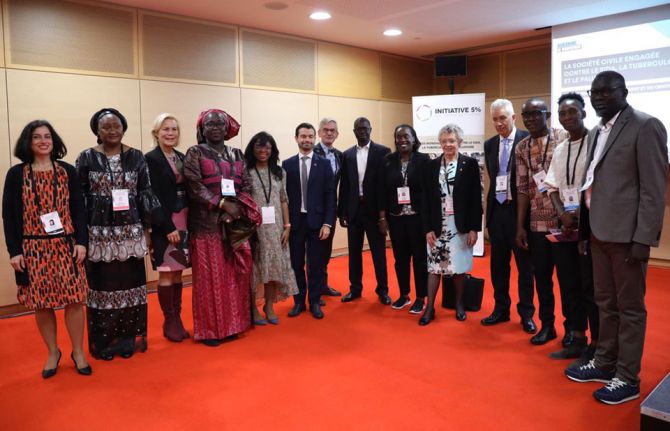
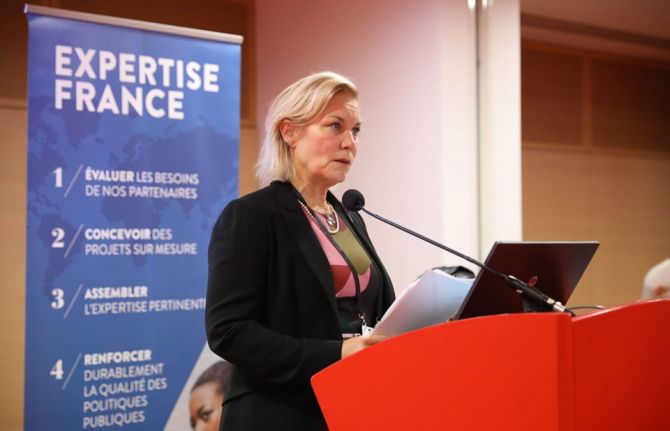
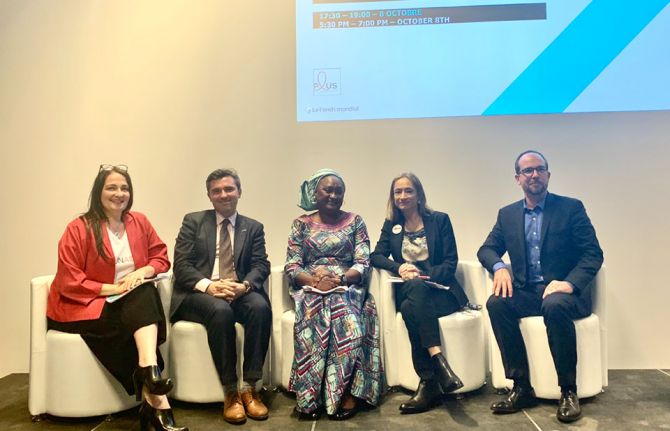
Feature Story
Investing in communities to make a difference in western and central Africa
09 October 2019
09 October 2019 09 October 2019Home to 5 million people living with HIV, western and central Africa is not on track to ending AIDS by 2030. Every day, more than 760 people become newly infected with HIV in the region and only 2.6 million of the 5 million people living with HIV are on treatment.
Insufficient political will, frail health systems and weak support for community organizations―as well as barriers such as HIV-related criminalization―are the most significant obstacles to progress. A regional acceleration plan aims to put the region on track to reaching the target of tripling the number of people on antiretroviral therapy by 2020 and achieving epidemic control. While progress has been made, that progress is not coming fast enough. Children are of particular concern―only 28% of under-15-year-olds living with HIV in the region have access to antiretroviral therapy.
“We need policies and programmes that focus on people not diseases, ensuring that communities are fully engaged from the outset in designing, shaping and delivering health strategies,” said Gunilla Carlsson, UNAIDS Executive Director, a.i., speaking at the Global Fund to Fight AIDS, Tuberculosis and Malaria Sixth Replenishment Conference, taking place in Lyon, France, on 9 and 10 October.
There are many examples of how investing in communities can make a difference. “The response is faster and more efficient if it is run by those who are most concerned,” said Jeanne Gapiya, who has been living with HIV for many years and runs the ANSS nongovernmental organization in Burundi.
Community-led HIV testing and prevention is effective, particularly for marginalized groups. “Most of the people tested by communities were never reached before and this shows how community organizations are unique and essential,” said Aliou Sylla, Director of Coalition Plus Afrique.
Reducing the number of new HIV infections among children and ensuring that women have access to the services they need remains one of the biggest challenges in the region. Networks of mothers living with HIV who support each other to stay healthy and help their child to be born HIV-free have been shown to be an effective way of improving the health of both mothers and children.
“Our community-based approach works. In the sites where we work we have reached the target of zero new HIV infections among children and all children who come to us are on treatment,” said Rejane Zio from Sidaction.
Financing remains a concern and although total resources for the AIDS response have increased, and HIV remains the single largest focus area for development assistance for health, domestic investments account for only 38% of total HIV resources available in western and central Africa, compared to 57% worldwide. Greater national investments reinforced by stronger support from international donors are needed to Fast-Track the regional response. Bintou Dembele, Executive Director of ARCAD-Sida, Mali, said, “We have community expertise, but we lack the funds to meet the need.”
Support is growing for community-based approaches in the region. Recognizing the importance of community-led work, Expertise France and the Civil Society Institute for Health and HIV in Western and Central Africa announced a new partnership on 9 October. “The institute brings together 81 organizations from 19 countries aiming to ensure better political influence at the global and country levels and to galvanize civil society expertise in programme delivery. This partnership is a recognition of our essential contribution,” said Daouda Diouf, Director of Enda Sante and head of the steering committee of the institute. “The situation in western and central Africa remains a priority. It is clear that community-based approaches are agile and appropriate for responding to pandemics,” said Jeremie Pellet from Expertise France.
Shifting to a people-centred approach has been at the core of reforms in the region. A growing regional resolve to accelerate the response and to strengthen community-led approaches that have been proved to work provides hope for the future of the HIV epidemic in western and central Africa.
Related information
Related

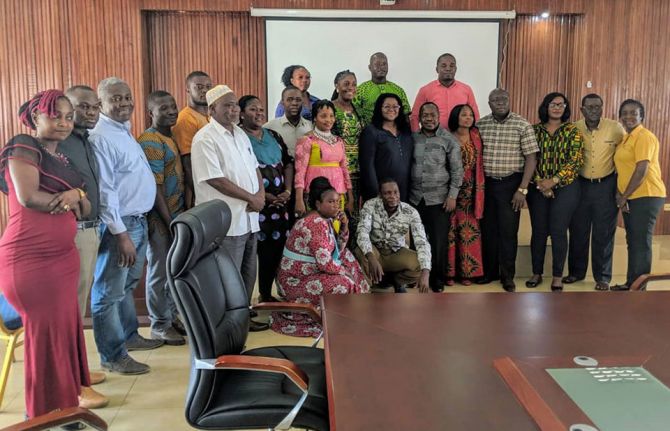
Feature Story
Liberia’s catch-up plan takes shape
27 March 2019
27 March 2019 27 March 2019The HIV epidemic continues to have a profound humanitarian and public health impact in western and central Africa, a region that risks being left behind in the global response to ending the AIDS epidemic. In July 2017, the African Union endorsed a regional catch-up plan for western and central Africa that seeks to rapidly accelerate access to HIV treatment and close the gap between African regions. National catch-up plans have been established in 18 countries in western and central Africa, including in Liberia.
It is estimated that in 2017, 40 000 people were living with HIV in Liberia, including around 3000 children aged 0–14 years. Fewer than one in three adults aged 15–49 years who are living with HIV have access to medicines that would keep them well and stop them passing on the virus to other people. For children, the situation is even more challenging, with just 18% on treatment.
However, there are encouraging signs that Liberia is scaling up its response to the HIV epidemic and adopting best practice programmes and policies to ensure the delivery and take-up of HIV testing, treatment and prevention services. Under the leadership of the Ministry of Health and the National AIDS Commission of Liberia, a Fast-Track plan for 2019–2020 has been developed that identifies high-impact programmes to accelerate the response, the urgent need for adjustments to existing programmes and barriers that must be removed in order to ensure better service delivery. It also recognizes that prevention measures must be reinforced and that stigma and discrimination associated with the virus must be reduced.
The Liberia catch-up plan seeks to triple the country’s test and treat figures, whereby people who test positive for HIV are immediately referred for treatment. The catch-up plan is guided by a location–population approach, with a service delivery bias towards the three counties with the highest unmet need for HIV testing, treatment and care services, urban areas and some other locations. Services are oriented towards adults aged 15–49 years, especially to pregnant women and to groups at higher risk, such as gay men and other men who have sex with men, sex workers, people who inject drugs, prisoners and mine workers. Infants exposed to the virus during pregnancy and breastfeeding are also a priority.
The plan also aims to tackle the low take-up of services by men.
“We are designing interventions that will encourage more men to test and know their status. Of those tested so far, 80% are women,” said the National AIDS Commission of Liberia Chair, Theodosia Kolle. “Stigma remains a major issue in Liberia.”
UNAIDS played a significant role in helping to draft the catch-up plan, mobilizing stakeholder involvement and ensuring that people living with HIV, civil society and members of key populations were included in order to shape its design. Around 70 people took part in a special two-day workshop in March to craft the necessary political and programmatic measures to improve service delivery, enhance community mobilization, increase funding and enable a more efficient use of existing resources and an improved monitoring and evaluation system.
The workshop was also an opportunity to validate the Global AIDS Monitoring (GAM) report for 2019 for Liberia. GAM is the world’s most extensive data collection on HIV epidemiology, programme coverage and finance and publishes the most authoritative and up-to-date information on the HIV epidemic—vital for an effective AIDS response.
“With teamwork we can reach the 2020 Fast-Track Targets as long as we prioritize and implement high-impact programmes,” said Miriam Chipimo, UNAIDS Country Director for Liberia.
The 90–90–90 targets included in the Fast-Track approach are that, by 2020, 90% of all people living with HIV will know their status, 90% of all people living with HIV will have access to antiretroviral therapy and 90% of all people on antiretroviral therapy will have viral suppression.
Region/country
Related
 Impact of the pause of US foreign assistance in Côte d'Ivoire
Impact of the pause of US foreign assistance in Côte d'Ivoire

19 February 2025

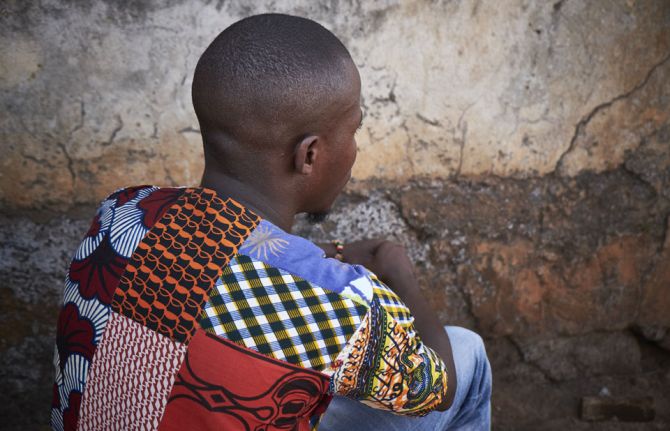
Update
Accelerating the AIDS response in western and central Africa
31 May 2017
31 May 2017 31 May 2017Only 1.8 million people of the 6.5 million people living with HIV in western and central Africa were on antiretroviral therapy at the end of 2015. This 28% treatment coverage of people living with HIV in the region contrasts with the 54% coverage in eastern and southern Africa in the same year.
In response to this HIV treatment shortfall in western and central Africa, UNAIDS, the World Health Organization (WHO) and other partners in the region have developed country emergency catch-up plans to accelerate the AIDS response. These plans call for tripling HIV treatment coverage within the next three years.
At a meeting on the sidelines of the 70th World Health Assembly to support the catch-up plan, health ministers and other representatives of countries in the region vowed to strengthen government leadership, make structural changes in their health systems and strengthen accountability.
The meeting, which was organized by the WHO Regional Office for Africa and UNAIDS, was attended by the health ministers of Benin, Burkina Faso, the Central Africa Republic, Chad, Côte d’Ivoire, Gabon, Liberia and Nigeria and representatives of Cameroon, Guinea and Sierra Leone. They all collectively agreed to put in place strong measures to accelerate HIV treatment in their countries.
All the participants agreed that health-service delivery models had to be transformed, notably by community health workers taking a bigger role in health-care delivery. WHO and UNAIDS will continue to work with the countries as they implement their plans for increasing access to HIV treatment.
UNAIDS is working with countries to achieve the commitment in the 2016 United Nations Political Declaration on Ending AIDS of ensuring that 30 million people living with HIV have access to treatment through meeting the 90–90–90 targets by 2020.
Quotes
“The situation is serious. We must pay close attention to western and central Africa. We must make sure that political leaders mobilize and focus their energies in these countries.”
“Renewed country momentum, under ministers’ leadership, to accelerate the response is critical as we move forward together to achieve the targets, while keeping people living with HIV at the centre of the response.”
Related
 Impact of the pause of US foreign assistance in Côte d'Ivoire
Impact of the pause of US foreign assistance in Côte d'Ivoire

19 February 2025

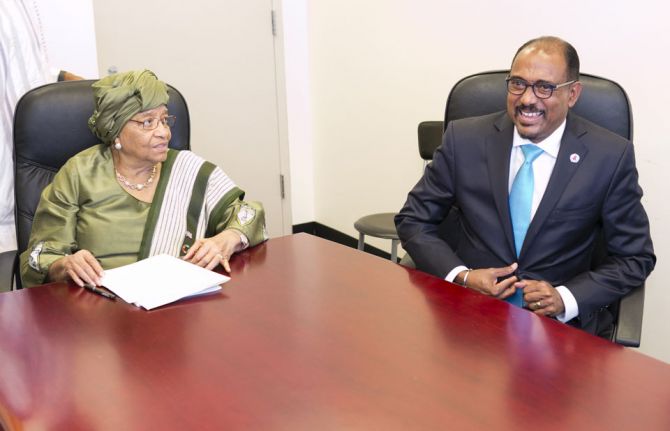
Update
UNAIDS Executive Director meets with President of Liberia, Ellen Johnson Sirleaf
23 September 2016
23 September 2016 23 September 2016UNAIDS Executive Director Michel Sidibé has met with the President of Liberia, Ellen Johnson Sirleaf, and discussed how to keep western and central Africa from sliding further behind in efforts to end the AIDS epidemic.
President Sirleaf recently assumed the role of chairperson of the Economic Community of West African States and Mr Sidibé hoped that she would use this platform and opportunity to bring leaders together to adopt an emergency plan for scaling up the AIDS response for western and central Africa.
President Sirleaf said that the country is emerging from rebuilding trust in health services after the Ebola crisis and agreed that it was time to assess what countries can do to focus and stay on course to end the AIDS epidemic.
Historically, western and central Africa has had lower levels of new HIV infections than other parts of the continent. However, new data are showing that while southern and eastern Africa has seen the number of new HIV infections decline, western and central Africa has not seen the same progress, in what is becoming an emerging emergency.
Quotes
“It is true that AIDS has not drawn the attention in this part of the world as incidence was not as high; that is not the case now and we must evaluate how we respond.”
“During your presidency you have given us hope and we are counting on you again to give hope to the region and the continent that we will end this epidemic.”
Region/country
Related
 Impact of the pause of US foreign assistance in Côte d'Ivoire
Impact of the pause of US foreign assistance in Côte d'Ivoire

19 February 2025

Update
Update on Ebola in Liberia
16 February 2015
16 February 2015 16 February 2015Liberia is one of the countries dealing with the devastating effects of the Ebola epidemic. Walter Gwenigale, Minister of Health and Social Welfare of Liberia and Bernice Dahn, Chief Medical Officer from the Government of Liberia shared with UNAIDS some of the challenges the country is facing nearly a year after the outbreak first began in late March 2014.
While initially numbers of people infected were low, by July 2014 it became evident that Liberia was experiencing one of the most widespread outbreaks of the disease in the region. By August, 14 of the country’s 15 counties had reported confirmed cases and on 6 August 2014, the President of Liberia declared a three-month state of emergency.
Joint action between the government, international and national partners ensued and by September there were encouraging signs of an apparent decline in new infections.
Multimedia
Region/country
Related
 Impact of the pause of US foreign assistance in Côte d'Ivoire
Impact of the pause of US foreign assistance in Côte d'Ivoire

19 February 2025

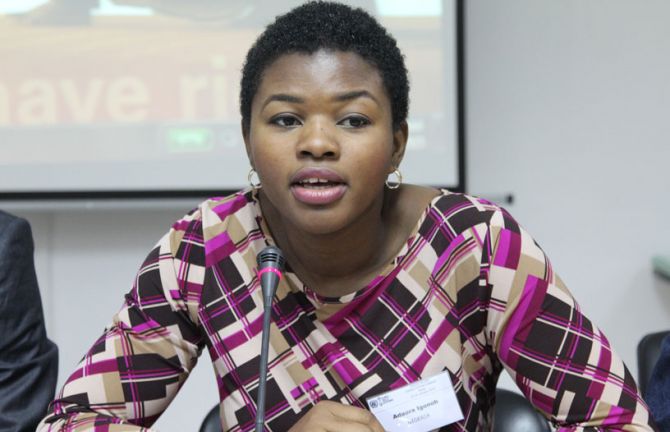
Update
Towards a programme to support Ebola survivors
29 January 2015
29 January 2015 29 January 2015The World Health Organization reports that the Ebola outbreak in West Africa has so far claimed 8800 lives. Almost 500 of the dead were health-care workers. However, the worst is over—fewer than 100 new cases were reported in the week up to 25 January and the international response is now moving from slowing transmission to ending the epidemic.
As the number of new Ebola infections continues to fall in Guinea, Liberia and Sierra Leone, survivors are organizing themselves in associations and groups to facilitate their reintegration and rehabilitation in the community.
Estimates put the number of survivors at between 5000 and 10 000. According to their accounts, survivors are experiencing various forms of stigma from extended family and the wider community. Livelihoods and earning potential have been adversely affected. In the case of children and adolescents, stigma has prevented or inhibited family reunification or placement.
The United Nations Mission for Ebola Emergency Response (UNMEER) held a meeting from 29 to 30 January in Dakar, Senegal, to discuss how the United Nations can integrate a new survivor component into its work and coordinate interagency efforts to ensure that no survivors are left behind. The meeting brought together Ebola survivors from Guinea, Liberia, Nigeria and Sierra Leone and about 50 representatives from the United Nations, including UNAIDS.
It was proposed that support for survivors would extend beyond distributing benefit packages upon leaving a health-care facility and would last for a longer period of time. Initial support might include blankets, cash and food, but mental health and psychosocial support for survivors and their family members could be part of a more comprehensive package.
Quotes
"Survivor stories are valuable now and for future outbreaks."
"We as survivors are the biggest untapped resource in the Ebola response."
“As people who were cured of Ebola, we would like to be fully involved in UNMEER activities.”
“We must learn from the HIV response and focus on a mutisectorial approach that includes civil society and government.”
“The number of survivors increases as cases and infection decline. Over time, a programme for survivors has emerged organically in the absence of a programmatic framework. It is about time for the United Nations to work with survivor communities and constituencies.”
Related information
Region/country
Related
 Impact of the pause of US foreign assistance in Côte d'Ivoire
Impact of the pause of US foreign assistance in Côte d'Ivoire

19 February 2025

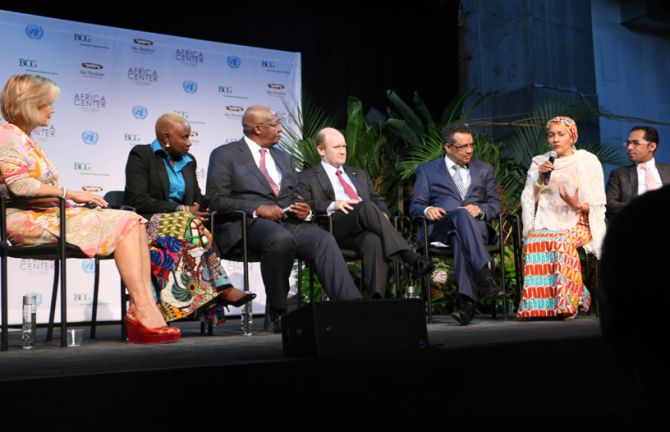
Update
Africa Rising: leaders meet to discuss sustainable development that leaves no one behind
22 September 2014
22 September 2014 22 September 2014How to realize Africa’s potential for the future of all its peoples and build international support for the continent’s development were key questions explored in the first session of the Africa Rising Forum held this week in New York.
Taking place at the Africa Center and organized by the Mo Ibrahim Foundation, the 22 September event brought together a number of African heads of state, United Nations partners, and leaders from African civil society and the business community.
They examined how to move beyond simply talking about the need for broad-based economic transformation and sustainable development to taking concrete steps to make them a reality, especially with regard to the post-2015 development agenda.
A session on ensuring shared prosperity looked at ways to improve investment and resource mobilization, champion entrepreneurship and ensure social protection. Another stressed that development cannot be achieved without the existence of good governance, peace, security and respect for human rights.
It was agreed that ensuring health for all was a critical facet of Africa’s rise, and that ending the AIDS epidemic as a public health threat by 2030 now a realistic goal. There was also a consensus that the continent’s rise should not only be measured in terms of overall wealth generated but by the inclusiveness of socioeconomic progress that leaves no one behind.
Region/country
- West and Central Africa
- Benin
- Burkina Faso
- Burundi
- Cameroon
- Cape Verde
- Chad
- Central African Republic
- Côte d'Ivoire
- Congo
- Democratic Republic of the Congo
- Equatorial Guinea
- Gabon
- Gambia
- Ghana
- Guinea
- Liberia
- Mali
- Mauritania
- Niger
- Nigeria
- Sao Tome and Principe
- Senegal
- Senegal
- Sierra Leone
- Togo
- Eastern and Southern Africa
- Angola
- Botswana
- Comoros
- Eritrea
- Ethiopia
- Kenya
- Lesotho
- Madagascar
- Malawi
- Mauritius
- Mozambique
- Namibia
- Rwanda
- Seychelles
- South Sudan
- South Africa
- Eswatini
- Uganda
- United Republic of Tanzania
- Zambia
- Zimbabwe
Related
 Status of HIV programmes in Mali
Status of HIV programmes in Mali

04 March 2025

Feature Story
Friends of UN Plus launched in Liberia
19 December 2012
19 December 2012 19 December 2012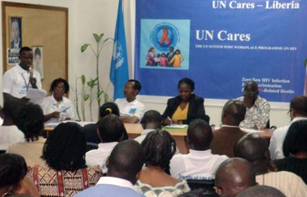
The launch of the ‘Friends of UN Plus’ at the UNAIDS Country Office in Monrovia. Credit: UNAIDS
The United Nations (UN) in Liberia has joined Mozambique, Swaziland, Rwanda and Ghana in launching the ‘Friends of UN Plus’ as part of its efforts to achieve a work environment that is free from stigma for all UN staff living with HIV and their families.
UN Plus is a global group of UN staff living with HIV which has more than 200 members worldwide from across different UN agencies. Its members advocate for issues that are of concern to staff living with HIV such as access to healthcare, ensuring no discrimination based on HIV status and maintaining confidentiality.
Despite the advocacy efforts that UN Plus has made to date, many staff members living with HIV still feel fearful of talking about their status. The Friends initiative, therefore, is meant to provide a supportive environment to staff living with HIV by all UN staff members regardless of their HIV status. It aims to be a forum through which the needs of HIV-positive staff and those caring for HIV-positive friends and family can be articulated and addressed.
The establishment of the ‘Friends of UN Plus’ was proposed and approved by the UN Theme Group in Liberia based on reports showing that 21 UN staff members tested positive between 2009 and 2012 out of 300. This HIV prevalence (17%) is significantly higher than the Liberia’s national HIV prevalence which currently is 1.5%.
The ‘Friends of UN Plus’ will implement various activities for staff living with HIV, including events and campaigns to sensitize the UN community around HIV-related stigma and discrimination and support groups for staff living with HIV. The group will also partner with the national network of people living with HIV to address issues that are of concern to staff living with HIV such as access to HIV treatment.
The launch of the ‘Friends of UN Plus’ took place at the UNAIDS Country Office in Monrovia and was attended by more than 70 guests including the Resident Coordinator (a.i.), the UNAIDS Country Coordinator, Heads of UN Agencies in Liberia, representatives from the National AIDS Commission and civil society organizations as well as family members of UN staff.
Sensitizing UN staff members on all forms of HIV-related stigma and discrimination will help our colleagues living with HIV to overcome their fear of potential repercussions of disclosing their HIV status at work
Dr Betru Woldesemayat, UNAIDS Country Coordinator in Liberia
The UN Resident Coordinator (a.i.), Madam Esperance Fundira, described the initiative as a key mechanism through which the UN can renew its commitment to provide financial and human resources to staff living with HIV. According to her, it provides an opportunity to strengthen the anti-stigma campaign in Liberia, and work towards a stigma-free work environment for UN staff.
Dr Betru Woldesemayat, UNAIDS Country Coordinator in Liberia, termed the launch of the Friends of UN Plus as a significant milestone in the AIDS response in Liberia, especially in its on-going efforts to reduce stigma and discrimination within and outside of the UN. “Sensitizing UN staff members on all forms of HIV-related stigma and discrimination will help our colleagues living with HIV to overcome their fear of potential repercussions of disclosing their HIV status at work,” he said.
Prior to the launch, UNAIDS and UN Cares met with the National AIDS Commission and a national network of PLHIV (LIBNET+) to identify ways to reach out to more employees living with HIV in Liberia, providing them with support and creating an enabling environment for them and their families.
External links
External links
Related
 Impact of the pause of US foreign assistance in Côte d'Ivoire
Impact of the pause of US foreign assistance in Côte d'Ivoire

19 February 2025

Feature Story
Prioritising gender equality in response to AIDS in Liberia
11 April 2012
11 April 2012 11 April 2012
Women returning from a farm with vegetables to be sold in a market on the outskirts of Monrovia, Liberia.
Credit: VII Photo/Marcus Bleasdale
Cynthia Quaqua is a mother, wife, the president of the Liberian Women’s Empowerment Network (LIWEN), and, perhaps most importantly, a survivor. Raped by soldiers during the Liberian civil war, she became pregnant as a young woman. Years later she fell ill and was diagnosed with HIV. Suddenly, she found herself abandoned by her relatives even began discussing where to bury her.
Fortunately, a Lutheran pastor gave her a place to live and directed her to a clinic where she could receive HIV treatment. She then found social support through a women’s group, where members had, like her, experienced sexual violence. Today, Cynthia is a picture of health and a powerful presence, taking her anti-retroviral medications twice daily. “The support from other women showed me that I was not alone and has allowed me to come this far,” she said.
Although Liberia is on the recovery from conflict, sexual violence remains prevalent. Research shows that 29% of ever married women experienced physical or sexual violence from a male intimate partner in the last 12 months.
The support from other women showed me that I was not alone and allowed me to come this far
Cynthia Quaqua. President of the Liberian Women’s Empowerment Network
Violence is both cause and consequence of women’s vulnerability to HIV. In Liberia, women account for 58% of all adults living with HIV. Young women and girls are particularly affected with an HIV prevalence more than double that of their male peers. The stigma associated with HIV and gender based violence is a major barrier to women accessing and adhering to HIV treatment and prevention services.
The President of Liberia and first ever female elected head of government in African, H.E. Ellen Sirleaf Johnson, has put gender equality and the empowerment of women at the centre of Liberia’s post-conflict and development agenda. Liberia was the first country to put into practice the UNAIDS Agenda for Women and Girls, setting strategic priorities for supporting women and girls’ rights, and gender equality through HIV responses.
Equally, the national response to HIV is prioritising gender equality as a smart investment for more effective programmes, under the leadership of the Minister of Gender and Development Julia Duncan Cassell. “We are fully cognizant that if the issues of HIV are to be fully addressed in Liberia, Africa and the rest of the world, we need to empower women living with HIV and get them involved at all levels,” said Mrs Cassell.

Cynthia Quaqua is a mother, wife, the president of the Liberian Women’s Empowerment Network, and, perhaps most importantly, a survivor.
Credit: UNAIDS
A mid-term review of the implementation of the national operational plan took place in Monrovia the first week of April involving partners from government, civil society, faith-based organisations, networks of women living with HIV and the UN system.
The review found that significant progress had been made in generating and maintaining political commitment to address HIV and sexual violence in Liberia. Data collection on sexual and gender based violence has increased and reporting structures have been harmonized, allowing for the routine collection of strategic information to inform national programmes.
Since the launch of the operational plan, government Ministries have put in place HIV and Gender co-ordination offices with domestic resources to champion HIV and gender programming, and HIV, gender and sexual and reproductive health services has been integrated into national polices. A coalition of actors has been established to address gender based violence and HIV, as well as contributing to addressing gender based violence broadly. The coalition meets monthly to monitor progress of activities.
We are fully cognizant that if the issues of HIV are to be fully addressed in Liberia, Africa and the rest of the world, we need to empower women living with HIV and get them involved at all levels
Minister of Gender and Development Julia Duncan Cassell
Other positive developments include the active engagement of associations and networks of women living with HIV in addressing sexual and gender based violence and increasing access to integrated HIV and health services for women.
But challenges remain, including the need to increase access to sufficient domestic financial resources and more effective coordination of different actors to maximise collective impact.
“UNAIDS and its co-sponsors recommit to intensify efforts against HIV and sexual violence by focusing on developing mutual accountability for results, partnerships for country ownership and generating program efficiencies through innovation and integration,” said David Chipanta, UNAIDS Country Co-ordinator for Liberia.
Related
 Impact of the pause of US foreign assistance in Côte d'Ivoire
Impact of the pause of US foreign assistance in Côte d'Ivoire

19 February 2025
 Government mitigation measures in Cameroon
Government mitigation measures in Cameroon

09 February 2025

Feature Story
Expanding HIV services in post-conflict Liberia
20 October 2010
20 October 2010 20 October 2010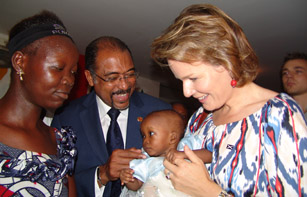
Photo: UNAIDS Executive Director Michel Sidibe, HRH Princess Mathilde of Belgium and mother of triplets at JFK hospital in Monrovia, Liberia. Credit: UNAIDS
UNAIDS Executive Director Michel Sidibé and UNAIDS and UNICEF Goodwill Ambassador HRH Princess Mathilde of Belgium, wrapped up a joint three-day mission to Liberia, which as a post-conflict country is working to expand its HIV services.
“It is a critical moment for Liberia. If we join together we can put the brakes on new HIV infections,” said Mr Sidibé. “But if we miss this opportunity the AIDS epidemic could regain momentum and more lives will be lost.”
During their trip, Mr Sidibé and HRH Princess Mathilde visited several health and educational facilities which are leading the way in the country’s re-energized AIDS response.
It is a critical moment for Liberia. If we join together we can put the brakes on new HIV infections
Michel Sidibé, UNIADS Executive Director
One site they visited was the JFK Hospital which is located in the capital city of Monrovia and offers a range of integrated HIV and maternal health services. It provides antenatal care to approximately 50 pregnant women each month, including voluntary HIV testing and counselling and services to prevent mother-to-child transmission (PMTCT) of HIV. On average, about 200 people visit the hospital’s antiretroviral therapy clinic every week for treatment and care.
Challenges of delivering HIV services in rural settings
As well as visiting hospitals in the capital, the group also paid a visit to the Phebe Hospital, a rural health facility located in the central Liberian county of Bong that provides a range of health services to around 329 000 people in four different counties. It is considered a leading provider of HIV services including antiretroviral treatment, voluntary HIV testing and counselling, PMTCT services and treatment for tuberculosis. A total of 67 people living with HIV are receiving services and 35 are on treatment.
Education is a key issue; boys and girls should be educated to show respect for one another.
HRH Princess Mathilde
However rural health facilities often face particular problems in delivering health services. For example two weeks ago the machine measuring CD4 counts, which helps monitor the progress of the virus, broke down and the hospital is unsure of when it can be fixed.
“We face many challenges. We have problems with follow up and we lose about a fifth of people who test HIV positive,” said Dr Garfee Williams, the Medical Director of Phebe Hospital. “This is due to many reasons—there are of course problems of discrimination – but also a lack of resources. We just don’t have the staff to go out into communities and provide the necessary care.”
Liberia has a generalised AIDS epidemic and latest data shows that there were around 35 000 people living with HIV at the end of 2007 and 2 300 people died of an AIDS-related illness in the same year.
Related
 Impact of the pause of US foreign assistance in Côte d'Ivoire
Impact of the pause of US foreign assistance in Côte d'Ivoire

19 February 2025
 Government mitigation measures in Cameroon
Government mitigation measures in Cameroon

09 February 2025




